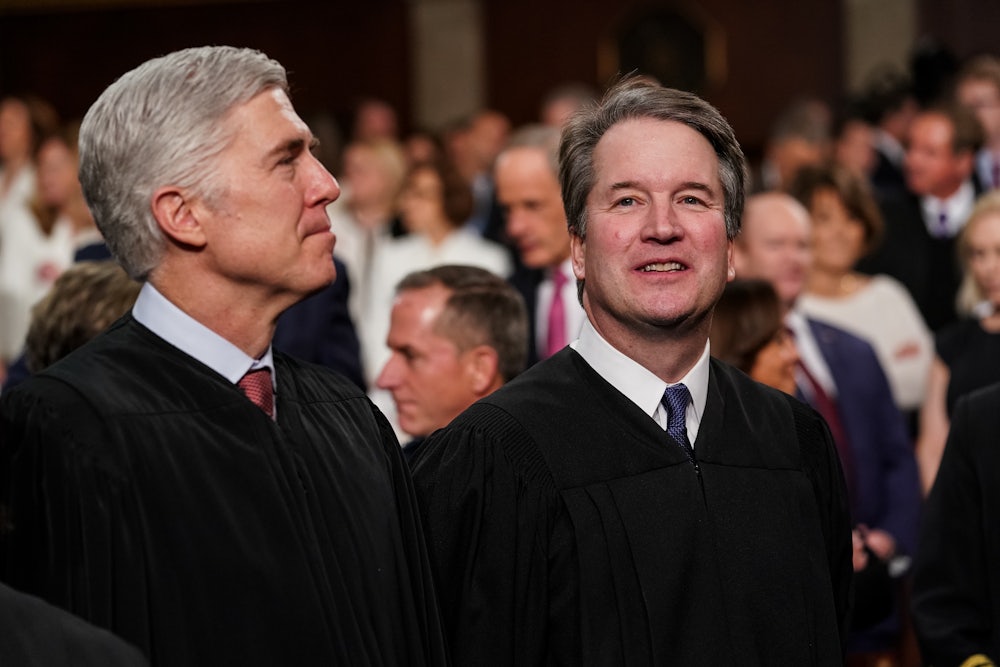Nearly four decades ago, Anne Gorsuch Burford resigned as the head of the Environmental Protection Agency. Though at the helm for less than two years, she left behind a notorious anti-environment legacy, slashing the agency’s budget by 22 percent and claiming to have cut the length of clean water regulations by more than 90 percent.
Burford died in 2004, but her approach to the planet lives on in her offspring: Neil Gorsuch, Trump’s first appointment to the Supreme Court. And on Thursday, Gorsuch proved that he truly is his mother’s son, handing down an opinion in which he threatens to give Republicans on the Supreme Court veto power over countless federal regulations—and potentially render the EPA an impotent husk.
It’s a sneaky opinion. For one, it’s a dissent, meaning Gorsuch didn’t technically get his way in Gundy v. United States. The case—which revolves around a 2006 statute known as the Sex Offender Registration and Notification Act—asks when Congress should be able to let executive agencies determine some details of policymaking. Gorsuch wanted to take away much of that power, writing that the near-century old legal principle behind it is “misadventure.”
Gorsuch’s dissent signals how the Court will rule in the future. He was very likely in the minority this time around because Trump’s newest appointee, Brett Kavaunaugh, sat out the case, since he wasn’t on the court when Gundy was argued. Justice Samuel Alito sided with the Court’s liberals in the case, but explicitly said he would reconsider his position if the Court decided to take the question up again. “If a majority of this Court were willing to reconsider the approach we have taken for the past 84 years,” Alito explained, “I would support that effort.”
Thus, when the next case arises, Kavanaugh will be there, and that means that there will almost certainly be five votes to write Gorsuch’s views into the law. Gorsuch’s opinion leaves little doubt that this new Supreme Court regime will seek to dismantle laws that permit agencies to regulate.
Two obvious examples of such laws are the Clean Air Act and the Clean Water Act. When Congress passed them, it said that the United States must have healthy, breathable air, and clean, drinkable water. But the EPA was given the power to determine how to implement many of the specifics of this overarching goal.
A key provision of the Clean Air Act, for example, requires certain power plants to use “the best system of emission reduction” available under existing technology, while also taking into account certain factors such as cost. So Congress sets the broad policy that power plants should use the best green technology that they reasonably can afford, but it’s up to the EPA to study that technology and impose more stringent requirements on power plants as this tech improves.
This method of lawmaking forms the backbone of much of American labor, anti-discrimination, health care, and countless other areas of law. It is also absolutely essential to any effective environmental protection regime. Gorsuch wants undermine this method of lawmaking, but doesn’t seem to know what he wants to replace it with. In his Thursday dissent, he merely states that Congress “may authorize another branch to ‘fill up the details’” of a policy.
It’s unclear what that means. But such a vague standard would effectively give the Supreme Court free rein to decide which of myriad regulations they would like to uphold and which they would prefer to strike down. The Supreme Court would have the power to invalidate large portions of laws like the Clean Air and Clean Water Acts, if it so decided. Congress would then have to create new laws to protect the air, water, and climate. But so long as Congress remains dysfunctional, with the Senate ruled by the filibuster and its obstructionist majority leader, Mitch McConnell—it’s highly unlikely that new statutes would be enacted to replace the old ones that Gorsuch and the conservatives on the new court would wipe away.
So the fate of thousands of regulations would come down to the whims of five Republican-appointed justices—and we already know that these justices aren’t friendly to clean air regulations.
Even before Gorsuch and Kavanaugh replaced Justices Antonin Scalia and Anthony Kennedy—both of whom were significantly more liberal than the man who succeeded them—the Supreme Court voted 5–4 to block President Obama’s Clean Power Plan, Obama’s single most ambitious program to fight climate change. The Clean Power Plan rested on a broad, but ultimately sound interpretation of the Clean Air Act that gives power to executive agencies to create policy.
Gorsuch’s plan is to grind down agencies’ power at the very moment that Congress has become too broken to write new laws. In doing so, he’s likely to render the EPA unable to function effectively even if Democrats win a landslide election that makes congressional Republicans irrelevant. That would have profound consequences on the United States’ ability to ever meet the targets necessary to prevent the world from warming to a catastrophic degree.
If Gorsuch’s mother were watching, she’d no doubt smile. But the rest of us have to live in the world he’s working so diligently to sabotage.
